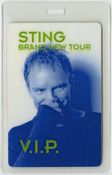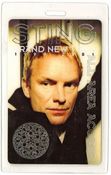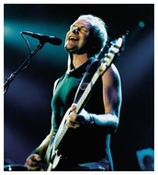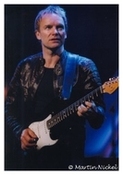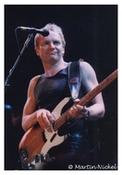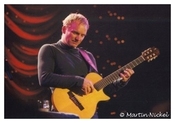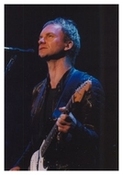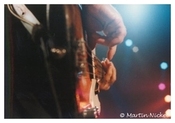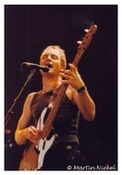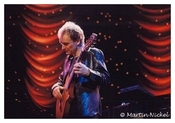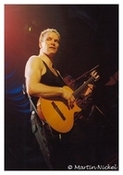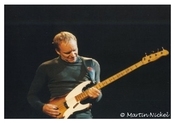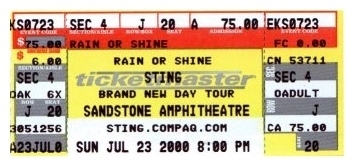
Brand New Day
Jul
23
2000
Kansas City, MO, US
Sandstone Amphitheaterwith Tracy Chapman
Sting ponders impact of love at Sandstone...
Former Police frontman Sting has both intrigued and alienated audiences for the past two decades with an intellectualism that more than borders on arrogance.
With such preconceived ideas about the artist, one might easily miss the simplicity and even humility that made Sunday night's show so special.
The hard focus of the show, which is in support of last year's 'Brand New Day' album, was the confusing nature of love, and it began by placing the question of love in the context of every other question.
With the melancholy 'A Thousand Years', the album's opener, Sting contemplated the world's greatest injustices and mysteries and came up with ''but one belief ... I still love you.''
It was a simple love song that turned the table on all other concerns, insisting that the simplest connection between individuals weighs as heavily as any other issue.
He then immediately complicated this dedication of love by reaching back to his first solo album for perhaps his most spirited statement of principle, 'Set Them Free'.
The trouble is on the table. Devotion is the greatest emotion in the world, and yet the finest act of love is to let another fulfill his or her own purpose, independent of its effect on you.
As the dual encore, 'If I Ever Lose My Faith in You' followed by Every Breath You Take', reminded that love is both necessary and dangerous.
Message in a Bottle and Fragile followed, connecting the power of love to the will to solve the world's problems.
What Sting is really talking about is compassion - the ability to weigh one's self as no greater or lesser than those with whom you share a bed and those with whom you share a troubled world.
The subtle, elegant arrangements that marked the evening made this compassion concrete. On 'Tomorrow We'll See', in which Sting pointedly assumes the role of a prostitute, Chris Botti's horn spoke the blues of urban isolation while Dominic Miller's extended guitar solo spoke for the yearning heart of a forgotten soul.
On 'We'll Be Together', the band launched into its first funky breakdown, investing all of its energy in the hope that love survives even the certainty of death.
Though Sting was energetic and engaged in the moment, his role was decidedly low key. Generally focusing his attention on call and response with the audience and interplay with his band, Sting made it clear that he needed those around him as much as they needed him. And that made the statement of compassion complete.
(c) The Kansas City Star by Danny Alexander
Former Police frontman Sting has both intrigued and alienated audiences for the past two decades with an intellectualism that more than borders on arrogance.
With such preconceived ideas about the artist, one might easily miss the simplicity and even humility that made Sunday night's show so special.
The hard focus of the show, which is in support of last year's 'Brand New Day' album, was the confusing nature of love, and it began by placing the question of love in the context of every other question.
With the melancholy 'A Thousand Years', the album's opener, Sting contemplated the world's greatest injustices and mysteries and came up with ''but one belief ... I still love you.''
It was a simple love song that turned the table on all other concerns, insisting that the simplest connection between individuals weighs as heavily as any other issue.
He then immediately complicated this dedication of love by reaching back to his first solo album for perhaps his most spirited statement of principle, 'Set Them Free'.
The trouble is on the table. Devotion is the greatest emotion in the world, and yet the finest act of love is to let another fulfill his or her own purpose, independent of its effect on you.
As the dual encore, 'If I Ever Lose My Faith in You' followed by Every Breath You Take', reminded that love is both necessary and dangerous.
Message in a Bottle and Fragile followed, connecting the power of love to the will to solve the world's problems.
What Sting is really talking about is compassion - the ability to weigh one's self as no greater or lesser than those with whom you share a bed and those with whom you share a troubled world.
The subtle, elegant arrangements that marked the evening made this compassion concrete. On 'Tomorrow We'll See', in which Sting pointedly assumes the role of a prostitute, Chris Botti's horn spoke the blues of urban isolation while Dominic Miller's extended guitar solo spoke for the yearning heart of a forgotten soul.
On 'We'll Be Together', the band launched into its first funky breakdown, investing all of its energy in the hope that love survives even the certainty of death.
Though Sting was energetic and engaged in the moment, his role was decidedly low key. Generally focusing his attention on call and response with the audience and interplay with his band, Sting made it clear that he needed those around him as much as they needed him. And that made the statement of compassion complete.
(c) The Kansas City Star by Danny Alexander

